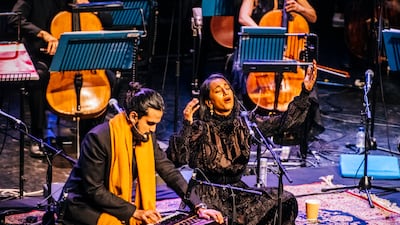Pakistani actress Mahira Khan married businessman Salim Karim in the hilly resort town of Bhurban earlier this month.
While videos of the ceremony on social media largely focussed on her ivory bridal outfit, as well as sentimental moments with her son, the background music struck a chord with many.
Khan walked down the aisle to Man Kunto Maula – an Urdu Qawwali, a form of devotional Sufi singing popular in South Asia.
But this is no ordinary Qawwali. It’s a contemporary version composed and performed by Orchestral Qawwali Project, a British group who combine the style with orchestral music. Remarkably, the lead vocalist of the project is a woman – Abi Sampa – a rarity for the musical tradition long dominated by male singers.
Though Sampa and her partner, composer Rushil Ranjan, aren’t frequent users of Instagram, fans were quick to tell them how their song had been used at Khan’s wedding.
“Because of the way that we’re wired, because we’re always trying to work on our music, we use social media intermittently, so we don’t tend to keep up with what’s happening on a day-to-day basis,” Ranjan tells The National.
“It’s very sweet that she chose to use that version of Man Kunto Maula,” adds Sampa. “For us, obviously it’s very nice to have the publicity, and really flattering when people decide to use the song. But it’s spiritual music, so it’s not the reason why we make it, the intention in the music is not that – it’s just a lovely byproduct.”
Man Kunto Maula was written by 14th-century Sufi poet Amir Khusrau, the “father of Qawwali”.
“It’s a very special Qawwali and it’s been sung throughout time by different Qawwals in their own styles, so it’s a very important piece both spiritually and historically,” explains Sampa.
The video shared by Khan on Instagram features just the first few seconds of their version, with Sampa’s deep, sonorous chants leading up to a crescendo of orchestral instruments, punctuated with the distinctive beat of a tabla hand drum. Yet, this short introduction was enough to capture the interest of her fans. “Who’s here after Mahira Khan’s wedding video?” writes one fan on YouTube.
Yet, even before its sudden spike in popularity among Pakistani fans, the Orchestral Qawwali Project has been making waves globally. Last year, Sampa and Ranjan joined forces with A R Rahman’s pioneering, all-female Firdaus Orchestra at Expo City Dubai. Earlier this year, they performed at the opening night of Bradford Literature Festival in the UK with a recital of Shikwa by renowned poet Muhammad Iqbal, in collaboration with the Manchester Camerata orchestra.
Sampa and Ranjan are not the first to combine Qawwali and orchestral music. Boston's Berklee College of Music previously performed a symphonic version of A R Rahman’s Kun Faya Kun in 2016.

Sampa points out that both genres are individually grand, collective art forms with large numbers of musicians and artists.
“I think what’s different [with us] is the amount of time that’s been invested into trying to make sure that both art forms can sit alongside each other and work together to elevate each other,” says Ranjan. “And I think that’s largely a product of the amount of time that Abi and I have had together to really finesse it, that makes it our own.”
Although the musical tradition is dominated by male voices like Nusrat Fateh Ali Khan, his nephew Rahat and the Sabri brothers, Sampa reveals she is not the first female Qawwali singer, citing Abida Parveen as someone who paved the way for other women.
Still, the experience of hearing Sampa’s voice hit the wide range of notes and pitches of these classical Qawwalis is spellbinding. During live shows, she sits in the centre of the stage next to a troupe of male back-up singers and a tabla player, surrounded by members of a diverse orchestra.
And while it’s her unmistakably feminine voice that contributes to making these new-age orchestral Qawwalis sound so profound, Sampa remains humble. “Whether it’s a male or female voice, it’s all about intention, the way you sing it and how you open yourself up to it,” she says. "You have to be very vulnerable and honest."
She adds: “The wave of love and optimism and acceptance that we’ve gotten from the Muslim community in general has been so loud."
Khan’s fans are now adding to the noise – of her 10.6 million followers on Instagram, many have praised her wedding video and, like any cinematic production, the music is central to the spark of emotions.
For Ranjan, Qawwalis are “a classical art, directed at evoking emotion”. He says that Man Kunto Maula is a particularly sentimental one for him and Sampa, as it was the first they recorded together. When it was first released in 2020, they were living in Abu Dhabi.
“The UAE will always have a really special place in our hearts,” says Ranjan. “Our hope is that we will be properly touring there in multiple cities, next year.”

